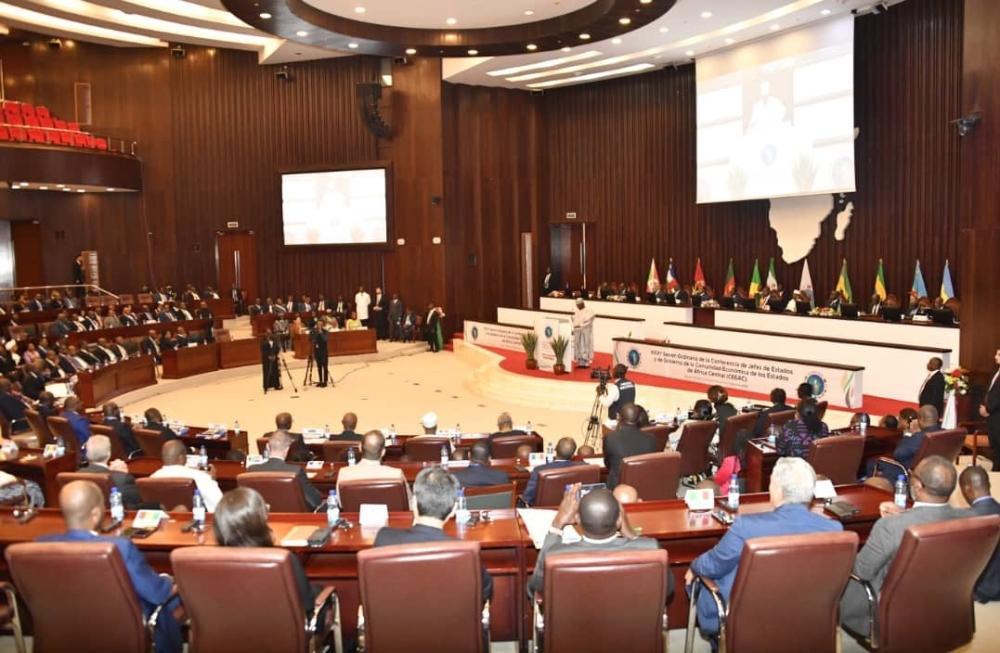Africa-Press – Rwanda. Rwanda’s withdrawal from the Economic Community of Central African States (ECCAS), on June 7, citing ongoing violations of the bloc’s founding principles by DR Congo and its allies, “is no great loss to the nation” since the bloc is the least effective of Africa’s regional blocs doing little more than having meetings, according to Tibor Nagy, a former United States Assistant Secretary of State for African Affairs.
In a post on X, Nagy who, in April, stressed that peace in the country’s east will only come when Kinshasa addresses the threat to Rwanda from the genocidal militia, FDLR, said “ECCAS will be worse off without Rwanda than vice versa.”
In an interview with The New Times, the Minister of Foreign Affairs and International Cooperation, Amb Olivier Nduhungirehe, has shed light on how things unfolded during the 26th Ordinary Summit of ECCAS, held in Equatorial Guinea on June 7.
Among the key items on the agenda of the summit was the formal handover of the bloc’s chairmanship from Equatorial Guinea to Rwanda. This was to follow the alphabetical order rotation principle that governs such transitions.
“This is right for Rwanda like any other member state because the chairmanship is given by alphabetical order, and it was Rwanda’s turn to exercise it,” Nduhungirehe said. Surprisingly, however, the minister explained, DR Congo, which had attended the ministerial meeting as well as the summit, through President Felix Tshisekedi, “requested for Rwanda not to exercise its rights of chairmanship.”
“They requested that Equatorial Guinea should extend its chairmanship for an additional year. This is unacceptable because, of all the countries, DR Congo is the least to deliver lectures and accuse anyone.”
Nduhungirehe pointed to Kinshasa’s continued destabilizing actions in the eastern region where the Congolese government sparked a conflict that has largely seen the country’s citizens – especially the Congolese Tutsi – persecuted, displaced, and cannibalized, while the government is also supporting FDLR, terrorist militia responsible for the 1994 Genocide against the Tutsi in Rwanda.
“With all the negative militia groups in its eastern region, they have also used European mercenaries to fight their battles,” he said, stressing how the Congolese government has escalated militarization efforts.
“On the ground, the situation is different, with more militarization, new attack drones imported by DR Congo. They are now using Colombian mercenaries from the US company Blackwater, of Erik Prince, for different attacks. So, all of that shows that DR Congo does not have peace at heart. They are just showing off that they are negotiating peace agreements while they do not believe in it,” the minister said.
Nduhungirehe highlighted several cross-border security incidents that impacted Rwanda directly.
“During the battle in Goma, there was shelling on our territory, which killed 16 and wounded more than 160, with 200 homes hit by shelling from the Congolese army,” he said.
“There was shelling on our territory in March, May and June 2022, and earlier attacks such as the one in Kinigi, Northern Rwanda, in 2019, which killed our people. And, after all that, can you imagine DR Congo lecturing Rwanda on violation of territorial sovereignty?”
‘ECCAS member states manipulated’
The minister expressed concern over ECCAS member states being influenced by a single member state.
“It is unacceptable to see that ECCAS member states accepted to be manipulated by the Congolese government, accepting the diktat by one single member state and requesting extension of the presidency to the current chair, which is why Rwanda withdrew from the bloc,” he stated.
He questioned the persistent manipulation by DR Congo, despite the ongoing efforts within different settings to make peace in the east of the vast unstable country.
“I travelled to the USA, on April 25, to sign a Declaration of Principles with my Congolese counterpart. That followed a meeting between President Paul Kagame and President Tshisekedi in Doha on March 18. Even as we speak, Rwanda and DR Congo are engaged in peace agreements. This week, experts from the two countries will go back to New York to negotiate this agreement,” he said, “At the same time that we are doing all of this, the Congolese government is busy running around in the region and international organizations accusing Rwanda and requesting sanctions.”
“This shows that DR Congo may not be interested in peace. It is just pretending in Doha, and Washington, and through the EAC process, that they are negotiating peace. But in fact, they have no political will and they have no good faith to achieve peace.”
ECCAS was already dysfunctional
Nduhungirehe pointed to longstanding institutional challenges within ECCAS, which he said had already diminished the bloc’s effectiveness.
“ECCAS was already dysfunctional. There are many solid infrastructure, investment, and integration projects that are not being implemented,” he said.
“There is also an issue of governance by the commission, where the presidency acts alone without consulting other members of the commission, and without calling ACTA. Since 2020, there has been no single financial audit of the commission. This is actually linked to the fact that many countries do not pay their contributions,” he said, emphasising issues within the organization’s structure that influenced Rwanda’s decision to exit the bloc.
“Manipulation was so high to the extent that during the closed session of heads of state, the presidency made statements that looked like statements by DR Congo. It was too much, and we decided to withdraw from this community.”
For More News And Analysis About Rwanda Follow Africa-Press






